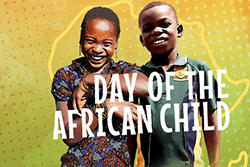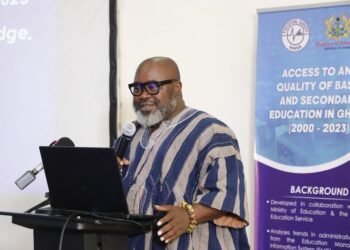On June 16, 2024, the world commemorated the Day of the African Child (DAC), established by the African Union in 1991 to honor the memories of the children who participated in the 1976 Soweto Uprising.
This year’s theme, “Education for all Children in Africa: The Time is Now,” highlighted the urgent need to address the challenges faced by African children and the necessity of bolstering efforts to protect and promote their rights.
In a heartfelt commemoration of the 2024 Day of the African Child (DAC), the Commission on Human Rights and Administrative Justice (CHRAJ) issued a crucial call to the government of Ghana. The Commission urged for an increase in budgetary allocations to fund reforms necessary to improve access to quality education for all children in Ghana.
“In Ghana, it was reported in the 2021 Population and Housing Census that a staggering 1,215,546 children between the school-going age of 4-17 years are not enrolled in school. Out of this number, nearly one million of these children have never experienced any form of formal education due to lack of access.”
Commission on Human Rights and Administrative Justice (CHRAJ)
The Commonwealth Global Youth Development Index Report of 2023 ranked Ghana’s education system at a disappointing 125th out of 183 countries. These figures are not just numbers; they represent the untapped potential and thwarted dreams of Ghana’s youth.
The continent has not achieved its targets of universal education, and statistics from UNESCO revealed that 20% of children between 6 and 11, 30% of children between 12 and 14, and 60% of children between 15 and 17 years are out of school in Africa. This shows that even if school enrolment has increased, there is a high rate of dropouts from schools.
Despite these daunting statistics, the Ghanaian government has made commendable strides. Policies such as the Free Compulsory Universal Basic Education (fCUBE), the Free Senior High School (FSHS) initiative, and the School Feeding Programme have been pivotal. These initiatives signify the government’s acknowledgment of education as a fundamental right and a cornerstone for national development. However, CHRAJ’s call to action is a reminder that more needs to be done.
The commission’s critique identified several critical gaps that need urgent attention. Among the most pressing issues are the approximately 5,400 schools that operate under trees due to a lack of infrastructure. This situation is a poignant symbol of neglect and underfunding.
Schools under trees are not just about the absence of buildings; they represent the lack of basic facilities such as furniture, proper sanitation, and essential learning materials. These conditions are not conducive to learning and certainly do not reflect a commitment to quality education.
Furthermore, the CHRAJ highlighted the issue of underqualified teachers and poor conditions of service. Teachers are the backbone of any educational system, and their professional development is crucial for the delivery of quality education.
Empowering Through Education

The 2024 Day of the African Child is not just a day of remembrance but a call to action. It urges all stakeholders to recommit to the vision of an Africa where every child can grow up healthy, educated, and protected.
“To this effect, the Commission encourages the government and the Ministry of Education to pay equal attention to the right to basic education by removing the various cost implications for parents, especially in poor rural areas.”
Commission on Human Rights and Administrative Justice (CHRAJ)
CHRAJ called on the government to invest in continuous professional training and improve the conditions of service for teachers. Ensuring that teachers are well-equipped, motivated, and fairly compensated is not an option but a necessity.
CHRAJ also emphasized the need to tackle societal norms that hinder children’s right to education. Issues such as child marriage and child labor are pervasive in many communities and continue to rob children, especially girls, of their educational opportunities.
Innovative and well-targeted sensitization programs are essential to challenge and change these harmful practices. Education is not merely about academic learning; it is about empowering individuals and communities to break the cycle of poverty and oppression.
The historical context of DAC, established in 1991 by the then Organization of African Unity (OAU), is a poignant reminder of the sacrifices made for the cause of quality education. The day commemorates the tragic 1976 Soweto Uprising, where students protesting for the right to be taught in their language were brutally repressed. This historical backdrop should inspire a renewed commitment to ensuring that every child in Ghana, and across Africa, has access to quality education.
CHRAJ’s advocacy is not merely about increasing funding; it is about ensuring that the allocated resources are effectively utilized to bridge the existing gaps. The government must prioritize the construction of proper school buildings, provide adequate learning materials, and ensure that all schools have basic amenities. Equally important is the need to eliminate the cost barriers that prevent children from accessing education, particularly in poor rural areas.
The call to action by CHRAJ on the 2024 Day of the African Child is a timely reminder that the future of Ghana depends on the education of its children. It is a call for the government to not only continue but to intensify its efforts in making quality education accessible to all.
The theme, “Education for all Children in Africa: The Time is Now,” should resonate in the halls of power and spur immediate and decisive action. The children of Ghana cannot afford to wait any longer. Their future—and the future of the nation—depends on the actions taken today.
READ ALSO: Sunak Scrambles to Revive Conservative Fortunes Before Election




















